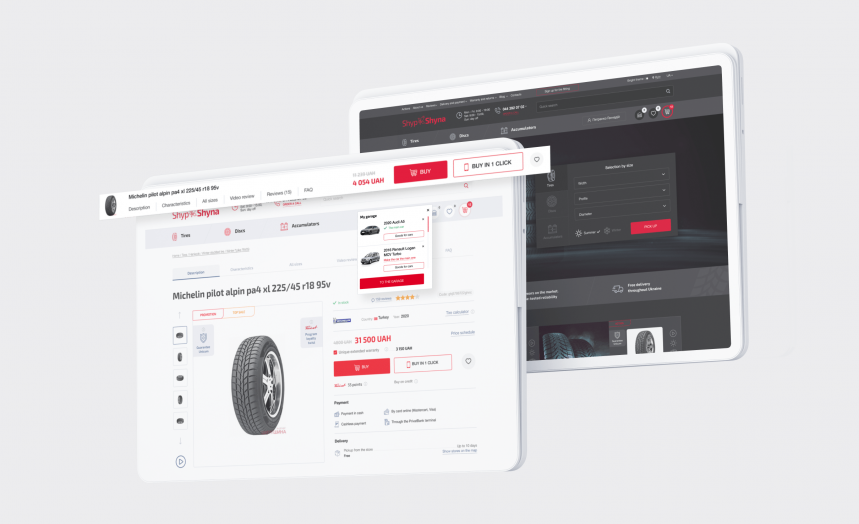
Custom Ecommerce Software Development
Choose the best developers for your E-Commerce project
The WEZOM team provides development services of any complexity to satisfy even the most specific E-Commerce business requirements.

Choose WEZOM to build a marketplace with the highest ROI that is perfectly tailored to the needs of your target audience.
To ensure your drone fleet doesn't operate in isolation, we can perform a range of integrations with your corporate solutions, whether ERP, GIS, cloud platforms, or other systems. We’ll implement this connection via APIs, middleware, or native SDKs to ensure seamless data transfer without delays.
Get the most out of launching your own E-commerce app
Software Company WEZOM
Our objective is to develop a profitable and effective solution that helps clients to expand their businesses and overcome financial constraints. We are committed to exceptional service and utilizing all resources to bring the finest products & services.
We've Been Awarded Plenty for the Milestones We Have Achieved

Case Studies
We will help you
What clients say

I am very satisfied wit the work process and project management. Everything was clear, on time and I had nothing specific to add. Yes, we are satisfied with the result of the work and the product meets the goals set. I can't wait to continue our work on the app.

Incode-Group is thrilled to recommend WEZOM for their exceptional services. Their development of an employee management system for our company has been transformative, revolutionising our operations and optimising efficiency across the board. WEZOM's consistent delivery of outstanding work has made them an integral part of our team. Their expertise in software development and UX design has played a pivotal role in enhancing our project's functionality and user experience. We are truly grateful for WEZOM's contributions and highly endorse their services.

Our collaboration with WEZOM to develop the interactive learning platform for Corpsoft.io was exceptionally positive. From the outset, WEZOM demonstrated a deep understanding of our requirements and goals for the project. Their team was proactive in proposing innovative solutions and ensuring that the platform met our needs for engaging and effective online education. Throughout the development process, communication with WEZOM was clear and transparent. They provided regular updates on progress, promptly addressed any issues or concerns, and sought feedback to ensure alignment with our vision. The project was completed within the agreed timeline and budget, showcasing WEZOM's commitment to delivering results.
Our approach
Get qualified e-commerce services from WEZOM experts.
How we workOur Research and Development Process
Market Research
Prototype Creation
Design Stage
Development
Project Testing
User Acceptance Testing
Project Deployment
Support and Maintenance
Questions & Answers
Should I choose a hosted or self-hosted ecommerce solution?
Choosing between these two options mostly depends on the amount of time and resources you have. The difference between hosted eCommerce solutions and custom eCommerce solutions is that one gives you the ability to manage your business without having to create your own platform, while the other allows you to have complete control over your business and operations.
How much do ecommerce solutions cost?
The cost of an average eCommerce solution varies between $5000 to more than $50,000. A custom eCommerce solution will cost you from $1500 to $30,000 depending on complexity level. It typically depends on costs that include design, development, and other costs.
Developing Custom E-commerce Solutions by Wezom
Wezom has been developing IT solutions since 2000, delivering numerous projects encompassing web and mobile applications across various domains. We started when the E-commerce market was in its early stages, and today we are experienced developers ready to share our knowledge, expertise, and skills to bring your individual commercial project to life.
In this article, you will learn about the modern E-commerce market, the services involved in creating E-commerce projects, how to choose the right technology stack, and the overall process of creating and launching an E-commerce website.
Choosing the Right Technology Stack for E-commerce
You face several critical tasks and questions:
-
Should you use ready-made E-commerce platforms, website builders, or opt for custom "turnkey" development? Each option has its own advantages and disadvantages.
-
How to select web hosting, considering factors such as plan cost, ease of use, support, features, security, speed, and reliability.
-
Which payment systems to use and how to make the payment process on the website as convenient as possible for customers while ensuring the security of all financial transactions.
-
What logistics software to utilize to control the delivery process, making it fast and secure.
It is best to discuss all these matters with specialists and avoid making hasty decisions to prevent potential errors that can be difficult and expensive to rectify.
Conclusion
Developing an E-commerce solution is undoubtedly an investment in the future of your business. It provides a competitive advantage, increases sales and customer loyalty, and helps adapt to the rapid changes in the modern E-commerce market.
If you need to develop a project for your enterprise or business, turn to Wezom. We are ready to discuss all the details of your project, offer various implementation formats for your tasks, and begin work as soon as possible, ensuring you see the final results promptly.
To contact Wezom's managers, you can use the contact form on our website or call us at +1 872 225 30 73.






